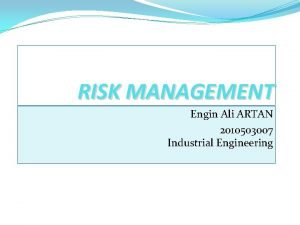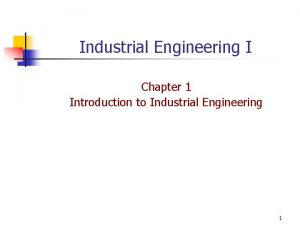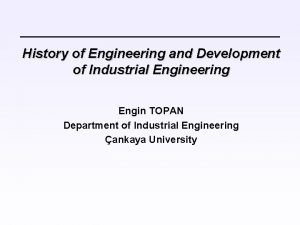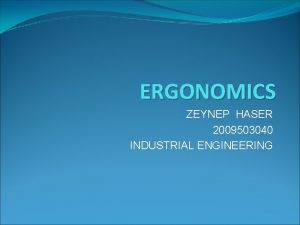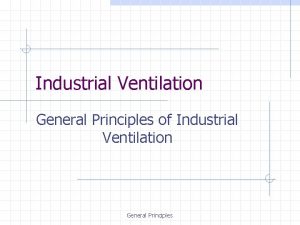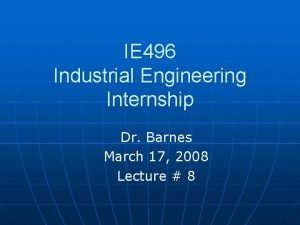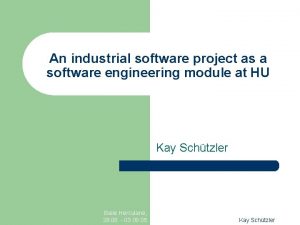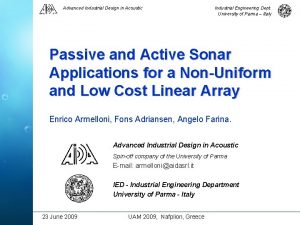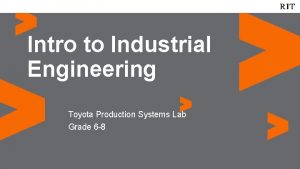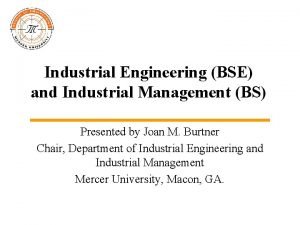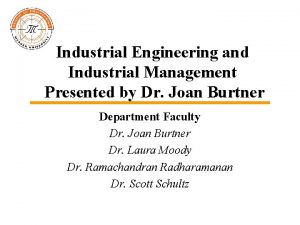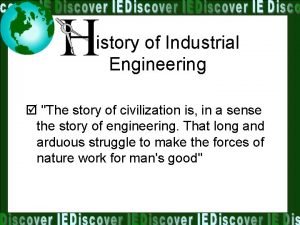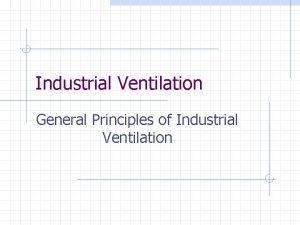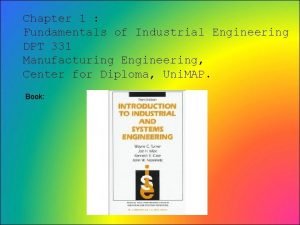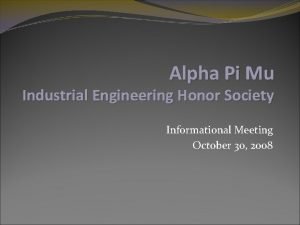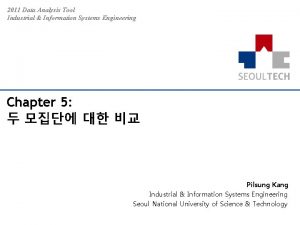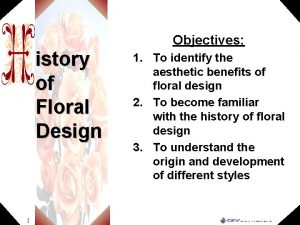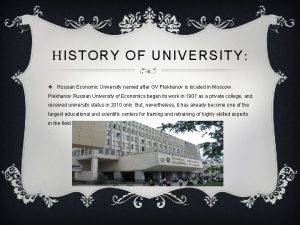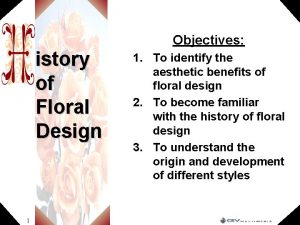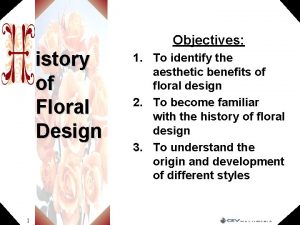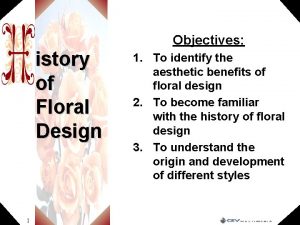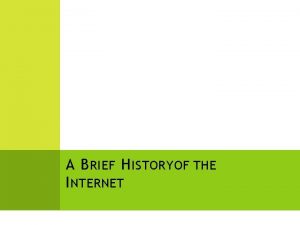istory of Industrial Engineering The story of civilization





















- Slides: 21

istory of Industrial Engineering þ "The story of civilization is, in a sense the story of engineering. That long and arduous struggle to make the forces of nature work for man's good"

þ Industrial Engineering is the newest of the major fields of engineering. þ It is difficult to exactly determine when Industrial Engineering began. . .

Specialization of Labor Adam Smith þ Adam Smith's Wealth of Nations (1776) promotes specialization of labor to improve productivity. þ Pin making process. þThe division of the task in four separate operations increased the output rate by almost five.

1, 000 pins 48, 000 pins þ One worker performing all the operations produced 1000 pins a day þ Ten workers employed on four more specialized tasks could produce 48, 000 pins a day.

Prototyping þ Boulton and Watt pioneered the idea of prototypes. They analyzed and tested a prototype before starting the mass production. Prototype P P Manufacturing Testing P New Prototype needed Good Prototype Start mass production

Production Lines þ Around the turn of this century, Henry Ford, on observing carcasses on a moving slat conveyor in a slaughterhouse, got the idea of progressive assembly of automobiles using conveyors.

Engineering Economics & Work Design þ In 1886, Henry Towne stressed the need for engineers to be concerned with the economic effects of their decisions þ Frederick Winslow Taylor "the father of Industrial Engineering” þHe developed the concept that work design, work measurement and production scheduling were engineering responsibilities.

ork design þ Taylor initialized the concept of work design, also called methods study, by applying engineering analysis to human work situations. þ Specifications of the exact method, tools and equipment to be employed þ Training the worker to perform operations as specified.

Work Design þ Taylor made an analysis of shoveling tasks. þ He was not the first one. Leonardo Da Vinci had calculated the rate at which dirt could be removed as part of one of his engineering projects þ Taylor noticed that the same type of shovel was used for all tasks.

þ A shovel full of rice coal weighed only 3 1/2 pounds, the same shovel full of iron ore weighed 38 pounds. þ After some experimentation he found that 21 1/2 pounds was the ideal shovel load and designed shovels of different sizes for different tasks þ Shoveling productivity improved dramatically

Work Measurement þ Taylor pioneered work measurement þ This activity is concerned with determining the amount of time an operator should be allowed for performing an operation Stopwatch Time Standard þ The reciprocal of such a time value permits the determination of the amount of production that is expected of an employee in a given period.

Frank B. Gilbreth þ His first job was as a bricklayer's helper þ Gilbreth improved the average production rate from 120 to over 350 bricks per hour þ He increased the speed by means of a more effective method. . . "working smarter, not harder". þ Reduced the number of motions from 18 to 5.

1908 - 1998 þ The beginning of the new century made a number of leading United States industrial firms initiate industrial engineering programs in their plants: þEastman Kodak, Dow Chemical, General Electric, Du. Pont, AT&T… þ Penn State offers the first ever degree program in Industrial Engineering. This year marks our 90 th anniversary!

Major Engineering Disciplines Agricultural Engineering Aeronautical Engineering Chemical Engineering Computer Engineering Civil Engineering Electrical Engineering Mechanical Engineering Industrial Engineering Images They Connote Farming or Farm Equipment Planes Refineries, Process Plants Computers, Internet, Software Bridges, Roads, Buildings Electronic Equipment, Power Generation Engines, Automobiles, Machines ? ? ?

Three main areas of IE Physiology Human-Machine Interface Automation Ergonomics Psychology Worker Safety Robotics Human Manufacturing Casting Factors Work Flow Optimization Operations Research Queuing Decision Making Simulation Plant Layout Materials Handling Inventory Quality Control

IE only engineering ranked in top 10 by Jobs Rated Almanac Rank Job Title 1 2 3 4 5 6 7 8 9 10 Actuary Computer Programmer Computer Systems Analyst Mathematician Statistician Hospital Administrator Industrial Engineer Physicist Astrologer Paralegal Rank Job Title 241 242 243 244 245 246 247 248 249 250 Football Player (NFL) Cowboy Lumberjack Roustabout Dairy Farmer Seaman Roofer Construction Worker Fisherman Migrant Farm worker

What is Unique about Penn State IE? þ The first IE department (1908) þ Over 7500 alumni þ Largest percentage of CEOs and company presidents in the College þ Undergraduate Program ranked 5 th by US News & World Report

Employment Statistics Projections based on Spring and Summer ‘ 97: Average salary: $ 38, 700

What Americans Earn Professional Biomedical Eng. Chemical Eng. Civil Eng. Electrical Eng. Mechanical Eng. Industrial Eng. Initial Pay $37, 750 $39, 863 $30, 690 $33, 000 $36, 935 $35, 244 Source: Fortune, June 26, 1995 Industry Average $72, 500 $73, 970 $62, 000 $65, 876 $65, 160 $67, 000 Typical Top Pay $150, 000 $179, 700 $141, 260 $146, 000 $155, 734 $215, 000

Study Abroad Programs Country University Spain University of Navarra Israel Technion University

Web Site and Other Contacts http: //www. ie. psu. edu Department Head A. Ravindran 865 -7601 Undergraduate Information Elena M. Joshi 863 -3395 emj 3@psu. edu Department of Industrial & Manufacturing Eng. 207 Hammond Building
 Risk management in industrial engineering
Risk management in industrial engineering Industrial engineering forecasting
Industrial engineering forecasting Industrial engineering tools
Industrial engineering tools Industrial engineering timeline
Industrial engineering timeline Ergonomics case study
Ergonomics case study Hejunka
Hejunka Chrono cycle graph is used for
Chrono cycle graph is used for Ndsu civil and industrial engineering building
Ndsu civil and industrial engineering building Industrial ventilation calculation
Industrial ventilation calculation Industrial engineering internship
Industrial engineering internship Industrial software engineering
Industrial software engineering Industrial design
Industrial design Industrial engineering
Industrial engineering Industrial engineering
Industrial engineering Industrial engineering
Industrial engineering Industrial engineering
Industrial engineering Industrial engineering psu
Industrial engineering psu Industrial ventilation engineering principles
Industrial ventilation engineering principles Fundamentals of industrial engineering
Fundamentals of industrial engineering Industrial engineering honor society
Industrial engineering honor society Industrial engineering definition iise
Industrial engineering definition iise Hình ảnh bộ gõ cơ thể búng tay
Hình ảnh bộ gõ cơ thể búng tay
